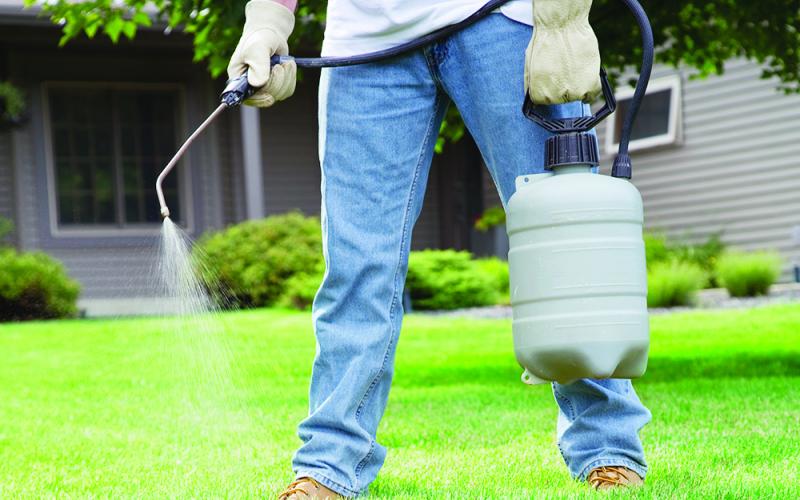Pesky weeds are beginning to take over lawns and gardens everywhere and this year is especially bad, some landscapers say, but there are solutions to rid your yard of the unwanted vegetation.
Local landscaper Grant Eberhardt of Eberhardt Landscaping said this is a bad year for annual bluegrass (poa annua) and he’s seen a lot of yards affected by it.
“We’ve got it everywhere,” Eberhardt said. “It’s awful this year.”
Eberhardt, and others he has talked to, speculate the problem is due to all of the rain the area received earlier in the year.
To combat the weeds Eberhardt sees on a daily basis, he gets ahead of the game by spreading a pre-emergent on his customers’ lawns in the fall and early spring. Then by early May he uses a nitrogen-backed pre-emergent that helps green up the grass, Eberhardt said.
In flower beds and other yard beds, Eberhardt spot sprays glyphosate, a broad-spectrum herbicide, to combat unwanted weeds. For those who don’t want to use chemicals, pulling out weeds by hand is the next best option, Eberhardt said, but that can be tiring and time consuming if you have a lot of weeds.
Fertilizing the grass helps combat weeds in the yard, Eberhardt said, and in addition to his other fertilizers, he offers organic fertilizers for those who don’t want to use as many chemicals.
Keeping mulch or pine straw spread in your bed can help suppress weeds as well, Eberhardt said.
“In your beds, if they’re down to the dirt, you’re going to have weeds,” Eberhardt said. “It’s not as bad if they’re mulched or pinestrawed, but still basically pull them or spray them.”
For those looking to eradicate weeds from a home vegetable garden, the University of Georgia Extension Office provides several publications with resources on how to prevent or remove them. The office says there are pre-emergent chemicals you can use that are safe for vegetables, which can be found at most garden centers. They also suggest mulching and even say you can use newspaper as a weed barrier by spreading three layers of it around your plant and then placing about three inches of organic mulch on top of that. A weed fabric barrier, with a permeable mesh fabric, is optimal for the home gardener, according to the UGA Extension Office.
The extension office says a nonselective herbicide like glyphosate can be effective on post-emerged weeds in your vegetable garden, but gardeners should be careful not to allow any drift of the chemical onto their vegetables or it could injure or kill the plants. To avoid drift, use extreme care and a shield on the end of your sprayer, or use the wick application technique by applying a product to target weeds with an applicator, such as a paint roller, according to the UGA Extension Office.
If you don’t want to use chemicals in your garden, weeds can be removed mechanically by hand or with a rake or garden hoe, according to the extension office. Weeds are easier to remove when they are young, lightly rooted and are in moist dirt. A lesser-used method of mechanical control is to burn the weeds out with a handheld propane torch, but the UGA Extension Office recommends taking extreme care to avoid burning your vegetables and wearing gear to protect yourself.
Information from the University of Georgia Extension Office was used in this report. https://secure.caes.uga.edu/
extension/publications/files/pdf/C%201144_1.PDF

